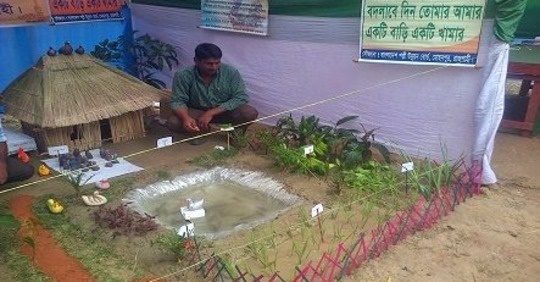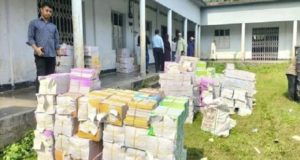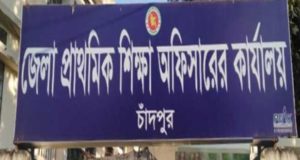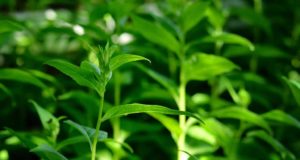Over 1.65 crore poor and extreme-poor people across the country are being facilitated by-“Ektee Bari, Ektee Khamar (EBEK)” project, one of the Prime Minister’s 10 priority initiatives.
“The government has taken the project to alleviate poverty and achieve the Sustainable Development Goals (SDGs) through fund mobilizing and farming. In line with the key objective of the project, it is playing a vital role to make the poor people self-reliant,”, EBEK Project Director Akber Hossain told this .
Under the project, a total of 67,757 ‘Village Development Associations’(VDAs) have been formed across the country from which about 32.70 lakh families are getting benefits.
The beneficiaries have deposited over Taka 1,221.58 crore till December 2017 and the government has
provided Taka 1,025.56 crore as grant under the project.
The revolving fund of the project is Taka 1,507.77 crore and the number of income generating project are now over 35.08 lakh. A total of Taka 4,705.87 crore has been invested in the income generating projects.
Mr Hossain said the goal of the project is poverty alleviation through e-financial inclusion,including fund mobilization, followed by family farming livelihood and income generation of the under privileged and smallholders of the country.
Through the project, he said, the government is assisting capital formation of the poor families, sharpening their skills through training and motivation, allowing them to sit together at courtyard meetings, enabling them to take decisions independently, enabling them to develop need based small family farms and ensuring marketing facilities for their products.
Mr Hossain said, `by now, members of the VDAs have become self-reliant and capable of running their businesses independently.’
In the project areas, low income families reduced to 3 percent from 15 percent and comparatively solvent household increased to 31 percent from 23 percent, he added.
Deputy Commissioner of Gazipur District Dr Dewan M Humayun Kabir said the project is playing a vital role to empower the rural and alleviate poverty in the project area.
He said a total of 431 VDAs has been formed across the district,from which 21,868 families are getting benefits and the beneficiaries have already deposited Taka 10 crore.
Though the associations, about Taka 43 crore micro credit have already disbursed among the members and the rate of recovery is 65 percent, he added. Chauddagram Upazila Nirbahi Officer Mohammad MainUddin
said a total of 203 associations have been formed in the 13 unions of the upazila from which about 6,958 families are getting benefits.
Rupali Begum, who is the owner of a duck farm, said, “I took Taka 15,000 loan from my association under EBEK project and opened a duck farm. Through the firm, I have become self reliant and contributing in the family income.” Through the project, she said, “We can build a good ties among the 60 members families and we always cooperate one another.”
The project started in 2010-2011 with Taka 14,920 million and finally the project was revised in 2013 with Taka 31,630 million for 40,527 villages.
The government has set a target to form 1.01 lakh VDAs across the country and the number of beneficiary families will be 60.62 lakh. Under the project, the poor saves Taka 200 per month and
the government gives the equal amount to them as bonus followed by Taka 1,50,000 as revolving fund annually. All the money has been deposited to the bank account of VDA.
After getting fund from the VDA each poor develops small farms like fishery, livestock, poultry, nursery and vegetable gardening. Thus every inch of land of the smallholders is
used efficiently for agro production.
After income generation the smallholder families deposit (repay) loan in installment to the account of the VDA. Thus the fund is being revolved and utilized for poverty alleviation by the poor permanently. Thus it stands as a sustainable poverty alleviation cycle challenging the vicious cycle of poverty. (BSS)
Report: AKM Kamal Uddin Chowdhury , oct 18,2019
 Chandpur Times Top Newspaper in Chandpur
Chandpur Times Top Newspaper in Chandpur



